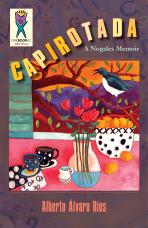Go to Amazon for further information. Originally published by W. W. Norton.
Teodoro Luna’s Two Kisses. New York: W.W. Norton, 1990.
Poems.
***
Publisher Description
“The marvelous and the real hold hands in this collection by a young poet whose work has been described as ‘written miracles.’ The poems here often center on the Luna family, and the notion that a small gesture can stand for the gatherings of a lifetime. Through Teodoro Luna, ‘who stepped into a marriage eighty-three miles long,’ we are alerted to just what a kiss was intended to be.”
“The landscape is Arizona and northern Mexico, where a world of borders prevails--between two cultures and two languages, and between what is open and what is secret. Himself born in Nogales, of Mexican-English parentage, Ríos speaks, in these magical poems, ‘to both my grandmother and my son at the same time.’”
Some reviews
“Each of his many characters (the book is a crowded village) is dealt with tenderly and humorously. . . . If Ríos' work is charming (and it is, amply), it is so in the sense of magic, where charms turn one thing to another and reveal essential truths.”—Booklist
“I love poems that are exact, and that reflect knowledge and are zany. . . . I think Ríos is a delicate poet, and a wise one. I welcome this lovely book.”—Gerald Stern
“There is a miraculous botany in the hybrid village consciousness of Teodoro Luna. It is a marriage of unlikely flowers, say the groom Kierkegaard to the bride Bashevis Singer. But this is something altogether new and glorious, these recent poems of Alberto Ríos.”—Norman Dubie
“Wonderfully odd, sometimes sad, never predictable. . . . Ríos continually surprises us in the way he stretches the meaning of words, turning them this way and that.”—Patty Somlo, San Francisco Chronicle
“Boldly playful, gymnastic and surreal… Ríos carves his poems from fable and parable, family legend, and bits of experience remembered through the supple, omnivorous intelligence of a child.”—Leslie Ullman, Kenyon Review
“Ríos is on to something new—as real poets of any time are.”—American Book Review

